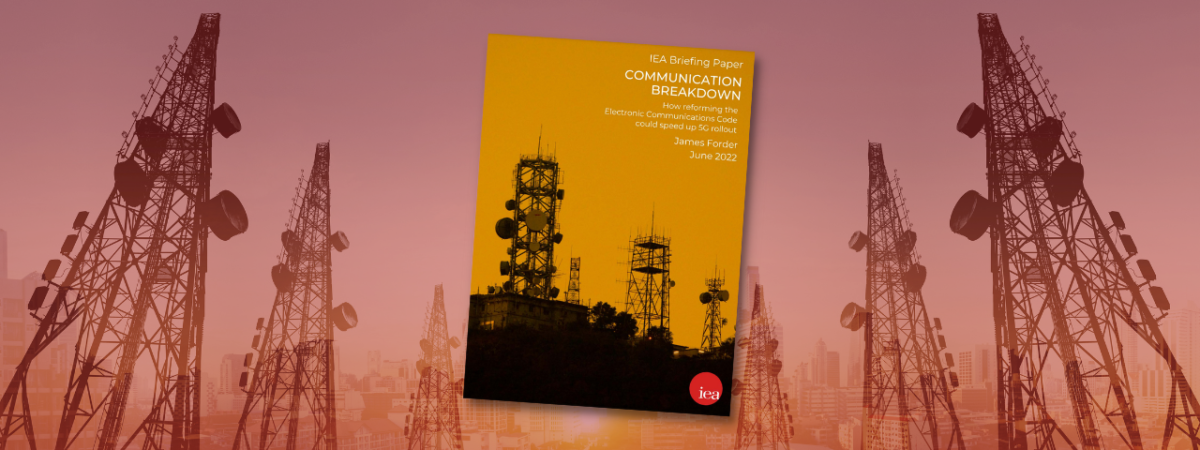UNFAIR PHONE MAST RENTS UNDERMINING 5G ROLLOUT, SAYS NEW PAPER
SUGGESTED



Rules that undercompensate landowners, including farmers, churches and community groups, for hosting phone masts are slowing the 5G rollout and threatening property rights
- Telecom companies can force landowners to accept mobile masts in exchange for a payment. Historically, this involved mutual agreement between operators and landowners, who were fairly compensated at the market value.
- The new Electronic Communications Code, introduced in 2017, changed the basis of land valuation and lowered compensation for landowners considerably. Thousands of small and large landowners, including farmers, churches and community groups have had their income slashed – in some cases, by over 90 per cent – according to Protect & Connect.
- The code has led to litigation, ill-will, and delays in reaching agreements, thus delaying the 5G rollout – a key tenet of the government’s levelling up agenda.
- Proposed new rules in the Product Security and Telecommunications Infrastructure Bill, which is due to be debated in the Lords on Monday 6 June, will make it easier to compel landowners to host masts, but fail to reform the formula for compensation.
- The author recommends the restoration of the valuation principles used before 2017, or for another rule be drafted to similar effect, to fairly compensate landowners and speed up the 5G rollout.
- Desmond Swayne MP said: “The Electronic Communications Code interfered with a market that was working effectively. The Government sought to reduce the market price and predictably created a shortage. To address the shortage that it created, the Government has now delivered a system that simply bullies landowners into making their sites available at the reduced price. This is a classic example of arbitrary government.”
A new briefing paper out today from the Institute of Economic Affairs argues that the government should revisit payments for landowners who host telecom masts, to speed up the rollout of 5G.
The Electronic Communications Code 2017 updated the rules that allow telecom companies to force landowners to accept the installation of equipment on their land and that govern the rent payments paid to landowners by the operators. The rules on payments to landowners failed to follow the recommendations of the Law Commission, which would anchor valuations to market prices.
The 2017 reforms reduced and, in many cases, very substantially reduced payments to landowners. The lower compensation has resulted in many landowners resisting equipment being put on their land. Legal action has followed, which is slowing down the 5G network rollout.
In response to these delays, the government has introduced the Product Security and Telecommunications Infrastructure Bill. However, the Bill focuses on the symptoms rather than the cause of the rollout slow down. It seeks to speed up the legal process and compel landowners to accept masts, undermining property rights, rather than updating the formula for compensating landowners.
The paper recommends that the Product Security and Telecommunications Infrastructure Bill, which is due to be debated in the Lords on Monday 6 June, be amended to restore the valuation principles used before 2017, or draft another rule having similar effect.
James Forder, IEA Academic and Research Director and author of Communication Breakdown: How reforming the Electronic Communications Code could speed up 5G roll-out, said:
“The price mechanism is a fantastically powerful tool. It is baffling that the Government seems determined to stop it operating, thereby depriving landowners of a fair return on their land, and slowing down 5G rollout at the same time. There is an urgent need to allow the market to function.”
Desmond Swayne, MP for New Forest West, said:
“This is a welcome report from the IEA. The Electronic Communications Code interfered with a market that was working effectively. The Government sought to reduce the market price and predictably created a shortage. To address the shortage that it created, the Government has now delivered a system that simply bullies landowners into making their sites available at the reduced price. This is a classic example of arbitrary government.”
ENDS
Notes to editors
Contact: media@iea.org.uk, 07763 365520
IEA spokespeople are available for interview and further comment.
Communication Breakdown: How reforming the Electronic Communications Code could speed up 5G roll-out is under embargo until 00.01 Sunday 5 June. An embargoed copy of the paper can be found here: https://iea.org.uk/publications/communication-breakdown-how-reforming-the-electronic-communications-code-could-speed-up-5g-rollout/



